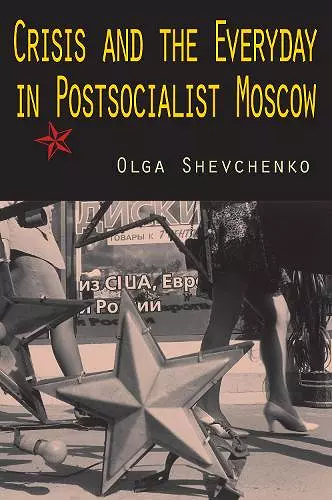Crisis and the Everyday in Postsocialist Moscow
Format:Paperback
Publisher:Indiana University Press
Published:17th Dec '08
Currently unavailable, and unfortunately no date known when it will be back

How Russians have navigated large-scale social change
Drawing on interviews with a cross-section of Muscovites, this study recounts how people made sense of the acute uncertainties of everyday life. It describes the identities and competencies that emerged in response to these challenges in various domains, from consumption and daily rhetoric to urban geography and health care.
In this ethnography of postsocialist Moscow in the late 1990s, Olga Shevchenko draws on interviews with a cross-section of Muscovites to describe how people made sense of the acute uncertainties of everyday life, and the new identities and competencies that emerged in response to these challenges. Ranging from consumption to daily rhetoric, and from urban geography to health care, this study illuminates the relationship between crisis and normality and adds a new dimension to the debates about postsocialist culture and politics.
[This] book is a must-read for anyone with an interest in postcommunist transition and its effect on day-to-day living. It will also be a great resource in undergraduate classes on market transitions, contemporary Russia and consumption.
* Contemporary Sociology *[Shevchenko's] fascinating and insightful survey shows how the ethnographical approach may cast new light on social and economic stakes in Russia, and highlights the role of cultural categories in times of large-scale social change.
* Europe-Asia Studies *This fascinating and elegantly written book will be of tremendous interest and use to scholars of Soviet/post-Soviet societies, particularly in the fields of sociology, anthropology, and cultural studies. . . . The accessibility of Shevchenko's writing will make this book useful for both undergraduate and graduate courses. 69.3, July 2010
* The Russian Review *. . . a sweeping panorama of everyday life that covers work, leisure, private life, and public (dis)engagement in postsoviet Russia.46 2009
-- D.N. Shalin * University of Nevada *Olga Shevchenko's book leaves us with tools and a template for rigorous qualitative research that can benefit research in a wide range of cases of profound transformations. Vol.115.5 March 2010
-- Balazs Vedres * Central European University *[A]n innovative contribution to the sociological study of quotidian life, alas not life under ordinary cir- cumstances. Shevchenko s book stretches beyond micro-sociological concerns towards fuller understanding of broad concepts such as social change, crisis and normality. The book is an ambitious effort to apprehend the sociological relationship between crisis and normality in the dramatic decade of change that followed communism's collapse. . . . [A]n illuminating, engaging contribution . . . .
* Social Forces *Shevchenko's work is timely and should be of interest to anyone concerned with the nature and consequences of economic and social change as well as those with a curiosity for all things Russian.Vol. 89.1, January 2011
* Slavonic and East European Reivew *Olga Shevchenko's Crisis and the Everyday in Postsocialist Moscow sets a very high standard of scholarship. A thoughtful, innovative and thought-provoking study, this book gives important insights into what proved to be one of the most dramatic episodes in Russia's recent history. . . . This book is an invaluable contribution to the study of contemporary Russia, with its mulitple paradoxes and contradictions. Vol. 5.1, 2010
* Cultural SocioloISBN: 9780253220288
Dimensions: unknown
Weight: unknown
256 pages